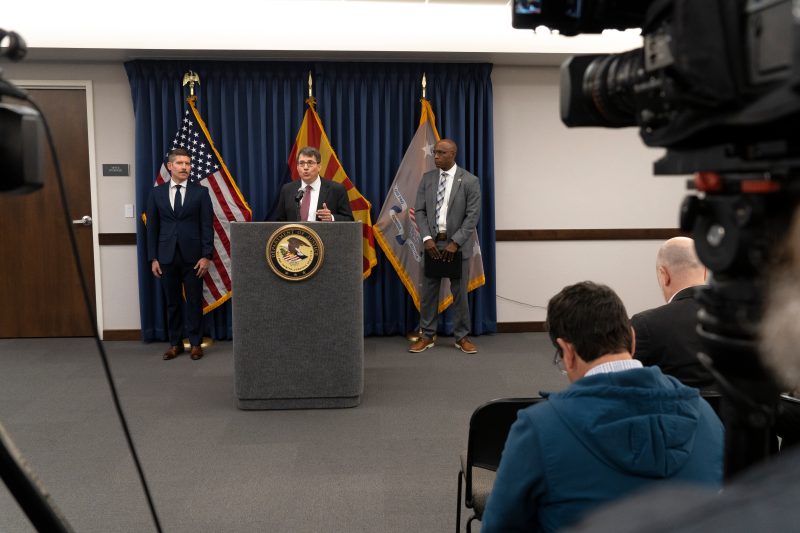
Federal officials say 20 have been charged for threatening election workers
PHOENIX — Justice Department officials said reports of widespread threats against officials running the 2020 and 2022 elections have resulted in charges against roughly 20 people, with more than a half dozen receiving sentences between one and 3½ years.
But the federal officials said at a news conference in Arizona on Monday that it remains to be seen if the stiff sentences will serve as an effective deterrent to would-be-criminals in future election cycles.
“Let these cases be a lesson not to take or attempt to take the rule of law into one’s own hands,” said U.S. Attorney Gary Restaino, Arizona’s top federal prosecutor.
When Donald Trump lost the 2020 presidential election and falsely claimed that Joe Biden wasn’t the true winner because of widespread voter fraud, election workers across the country — from rank-and-file employees who helped process ballots to top state officials who certified or defended the results — came under attack. In June 2021, Attorney General Merrick Garland launched the Election Threats Task Force to combat violent threats facing election workers.
An outsize number of the prosecutions have involved Arizona, a competitive swing state in the 2020 election that helped clinch President Biden’s victory and became a hotbed for conspiracy theories falsely claiming that the election was rigged and Trump actually won. Officials said that they have seven federal cases in which people who reside outside Arizona have been charged with threatening the state’s election workers.
Hours before the news conference, a federal judge in Arizona sentenced an Ohio man to 30 months in prison for threatening the state’s top election official in 2022. Around the same time, a man from Iowa reported to prison for separate election-related threats he made to two elected officials in Arizona.
John Dixon Keller — who works in the Justice Department’s Public Integrity unit and heads the task force — said that the vast majority of tips received did not result in any charges.
Officials explained that investigators have to assess whether each reported threat crosses the line from free speech to an actual violent or death threat. That includes determining why the person sent the threat and the effect that it had on the person who received it.
They said that threats typically occur around the time of elections and vote counting and that election denialism is at the root of many of the cases. Election workers have left their jobs as a result of the threats they, their families and their colleagues have received, the officials said.
“Death threats are not debate. Death threats do not contribute to the marketplace of ideas,” Keller said. “Death threats are not a protected constitutional right.”
Judge Steven P. Logan — who sentenced the man in Arizona on Monday for threatening an election official — said from the bench that violent threats have menaced American institutions and the people who work for them.
“It’s okay to disagree, but when you take it to this level,” the judge said, “it’s an absolute attack on the rule of law.”
Joshua Russell, 45, of Ohio, had pleaded guilty last year to sending threatening communications in 2022 to then-secretary of state Katie Hobbs, a Democrat who is now the governor of Arizona. Russell left three expletive-laced voice mails for Hobbs, who oversaw Arizona’s midterm elections.
Logan read portions of some of the messages at the sentencing.
In one, Russell warned, “The entire nation is coming for you. And we will stop, at no end, until you are in the ground. You’re a traitor to this nation. … You just signed your own death warrant. Get your affairs in order, cause your days are very short.”
Before he was sentenced, Russell had expressed regret and shame for the voice mails, which he left as he spiraled into depression and drug and alcohol use, according to court records. As his relationship with his son grew strained, records said that he became obsessed with politics and “felt out of control.” Russell said Monday that he realizes — through the help of therapy and sobriety — that his actions were wrong.
“I take complete and total responsibility for my immature actions,” he said, adding that he got “caught up on social media” as he sought an outlet to share his frustrations amid the falling-out with his son.
Russell’s parents accompanied him for the sentencing, along with his sister, who lives in Arizona. The family listened silently during the hour-long proceeding as the judge advised their son to use his time in prison to better himself, to read the U.S. Constitution and to find happiness.
Russell had asked the judge to consider giving him time to get his affairs in order before surrendering to prison.
“I’ll give you a minute to say goodbye to your family,” the judge said. “You’re going to prison today.”
Russell turned around and walked toward his family. His mom cried as she clung to him tightly.
His father wrapped his arms around Russell, who whispered something. His sister hugged her brother before he was escorted out of the courtroom through a side door.
When he was gone, his mom dabbed her eyes with tissue. The sentence, she said, had been too harsh.
“He’s shown he’s learned his lesson,” said Vickie Russell. “It was way more than it should have been.”
Stein reported from Washington.
